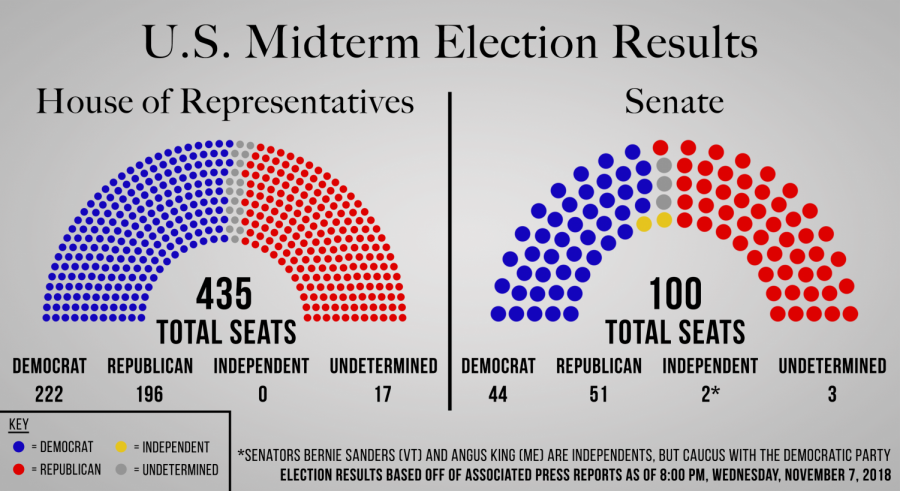Campus engagement in 2018 midterm elections
November 8, 2018
The U.S. midterm elections captured the attention of the University and the country. The Democrats have reclaimed the House of Representatives, while the Republicans will maintain control of the Senate after picking up two additional seats.
On a national scale, this was a historic election, as more women than ever before were elected into office. This midterm election is also unique because of the national attention that some races such as the Texas Senate race and the Georgia gubernatorial race received.
In Texas, Republican Senator Ted Cruz, the incumbent, defeated Democrat Beto O’Rourke in a historically close race, with Cruz winning 51 percent of the vote. In Georgia, the Republican candidate Brian Kemp bested Democrat Stacey Abrams in a much-anticipated contest by around 1.3 percent.
“Overall, I think the House win for the Democrats means a solid push towards a better system of checks and balances on the president, but most importantly there was a record number of women elected last night, as well as a lot of firsts for other minorities, which means that finally Congress is going to start to look like a better representation of what America looks like,” Laura Bart ’19 said.
“In my opinion, the Senate seems to be moving closer to a place where the GOP will be constantly favored to hold a majority, given how much more nationalized Senate races have become in recent years,” Caleb Paasche ’20 said. “Creating a majority will be difficult for the Democrats, given the party’s tendency to appeal to urban areas and secondary status in many of the smaller states across the country.”
Locally, in the Pennsylvania Senate race, Democrat incumbent senator Bob Casey defeated Republican Lou Barletta. Casey won with 55.5 percent of the vote overall, but in Union County, Casey received only 40.8 percent of the vote. In the local race for congress, Republican incumbent Tom Marino won reelection to represent the 12th Congressional district, which covers 15 counties, 10 of which are in northeastern and central Pennsylvania. He received 64.5 percent of the vote. In the statewide Pennsylvania governor’s race, Democrat Governor Tom Wolf won reelection, defeating Republican challenger Scott Wagner with 57.6 percent of the vote. Voters in Union County again voted differently than the majority of the state, with 44.6 percent voting for Wolf and 53.3 percent voting for Wagner.
Professor of Political Science Scott Meinke remarked that the majority of Pennsylvania’s, and specifically Lewisburg’s, election outcomes were not surprising. “Governor Wolf and Senator Casey had been running well ahead of their Republican opponents throughout the year, and they won comfortably. Statewide, the new congressional district map mandated by the Pennsylvania Supreme Court led to a big shift in the state’s U.S. House delegation. Democrats took half of the state’s seats, and the state will have four women in Congress—up from zero in the current Congress,” Meinke said.
“Locally, the Republican U.S. House incumbent and Republican state house incumbent both won. These are both heavily Republican districts, so it is not surprising that these GOP members survived tough election cycle, despite facing two unusually good Democratic challengers who ran effective campaigns,” Meinke said.
At the University, students were engaged leading up to the election. Meinke believes that student “engagement was higher than usual for a midterm election, but not nearly as high as it was in presidential years like 2008 and 2016. Some students were especially energized and active and worked to try to mobilize other students to participate, even if many students weren’t as motivated without a presidential contest on the ballot.”
On campus, organizations such as College Democrats have been very involved all semester with both the University and local community to increase student political participation and awareness, focusing on Get Out The Vote (GOTV) Campaign efforts days leading up to the election.
“For the month of September we tabled in the LC, the Caf, and the Library to help register people to vote before the Pa. deadline. We helped register people in Lewisburg as well as their home states. If people wanted to register in their home state, or if they were already registered in their home state, we provided them with an absentee ballot application so they would be able to vote by mail,” President of College Democrats Elizabeth Gray ’19 said.
Additionally, on Nov. 5, the day before the election, College Democrats volunteered with Union County Democrats specifically helping with phone banking and calling voters to remind them to vote.
In addition to initiatives by College Democrats, the Political Science department and the Bucknell Institute for Public Policy (BIPP) hosted numerous events leading up to the election. The University’s Conservatives Club could not be reached for comment on their election involvement.
Meinke added that two students, Midge Zuk ’19 and Gray “worked as [Mauch] fellows supported by the department and the League of Women Voters to host nonpartisan student-led discussions surrounding the election. Most of these events drew a good number of engaged and interested students, and that was great to see.”
“I feel really lucky to be in college during all of this political turmoil. Being in an environment where there are so many outlets for discussion and education is such a gift,” Zuk said.
In reflecting on the outcomes, Zuk said that “while not every race turned out like I’d hoped, reading the stats about the huge increase in voter turnout and seeing surprising races change due to that turnout gives me hope for upcoming elections. I hope that our generation understands that political engagement is a lifelong commitment, not just a knee-jerk reaction.”
“I also think it’s important for people on Bucknell’s campus to get more politically aware and involved and obviously vote because in order to make society better we have to start caring about things that might not affect us directly,” Bart said.






















